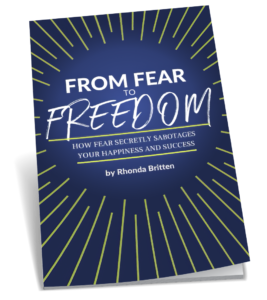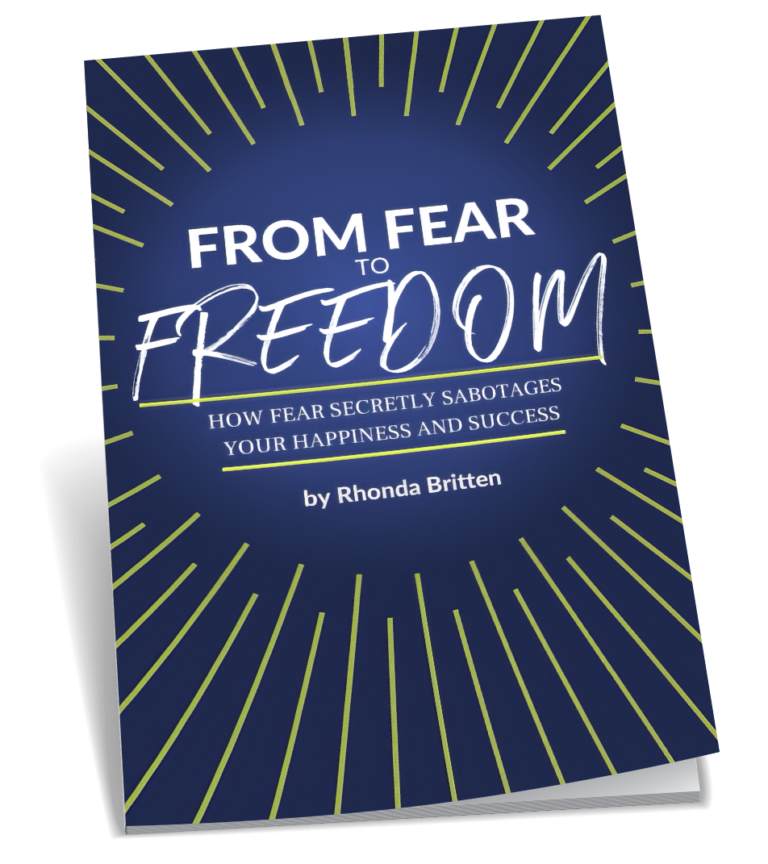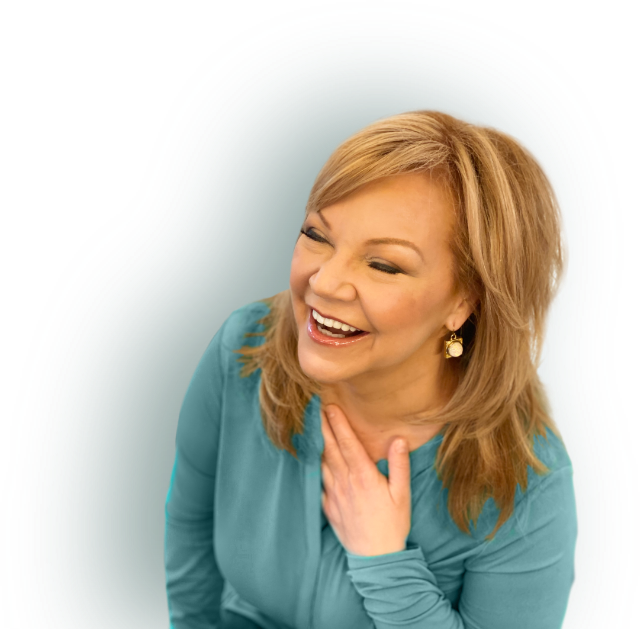Fear of rejection is one the top ten most common fears. Every human being on this planet has a fear of rejection. Sure, it’s more severe for some than others, but every single human has faced a fear of rejection at some point in their lives.
Today, if you keep reading, you’ll learn that fear of rejection isn’t personal—it’s actually handed down through our DNA. That’s right: Fear of rejection has been passed down from your ancestors to you through your DNA.
It’s completely natural to fear rejection and do all you can to avoid rejection. It’s not a fun feeling! But that natural, biological response shouldn’t rule your life, and it shouldn’t keep you from living the life your soul intended.™
I want you to be able to face rejection in stride, to not fall apart, to not shut down, to not walk away, to not beat yourself up, to not be humiliated, and on and on and on.
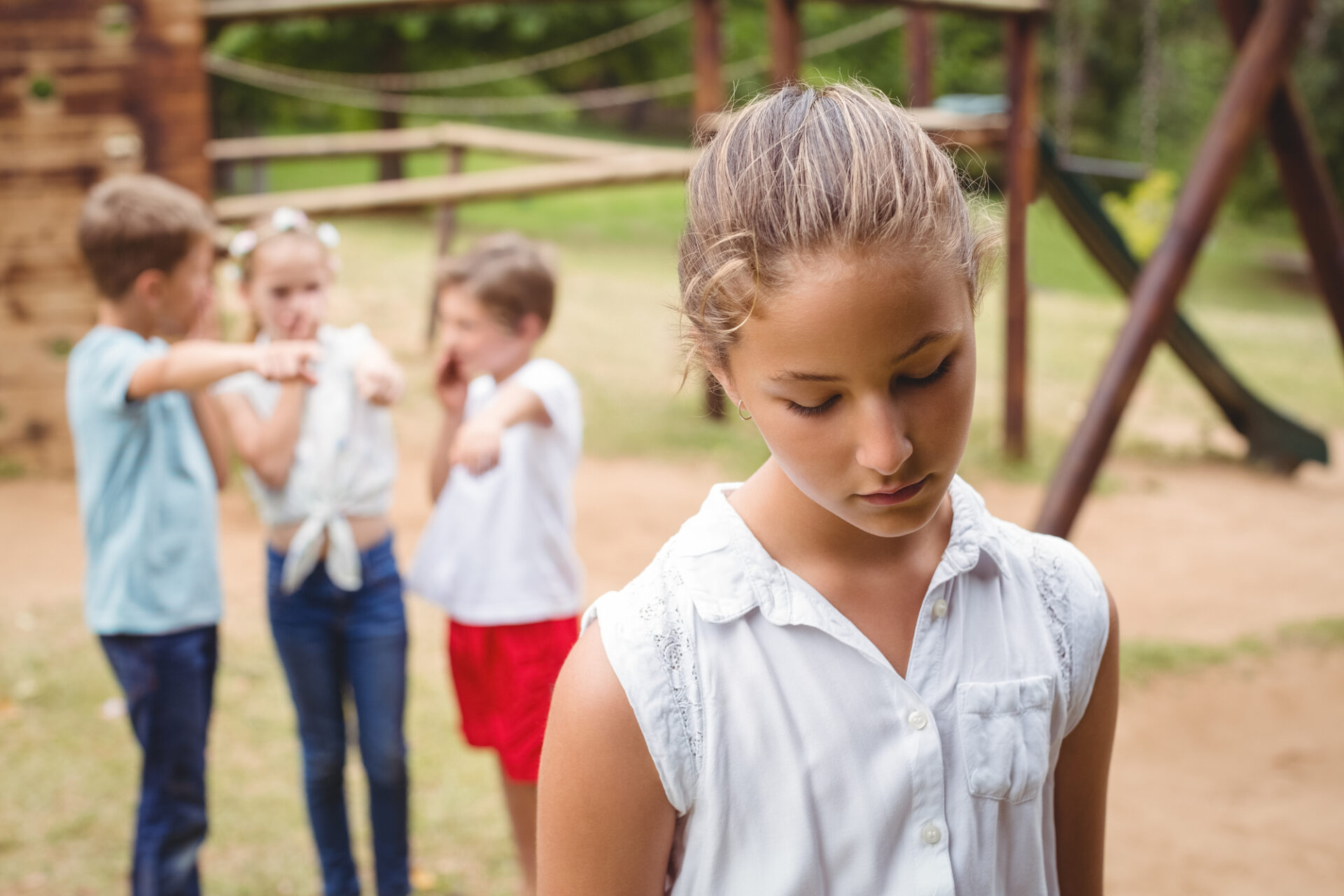
I want you to be the resilient, confident, happy person you are underneath that cloak of fear that’s kept you down for far too long.
I’m so glad you’re here with me today because I’ll show you how to move beyond your fear of rejection.
You may not realize it, but that fear is stopping you from living your life to its fullest. It’s paralyzing you. It’s keeping you from connecting with people and having deeper relationships.
It’s blocking you from sharing your true gifts and talents. It’s pushing you away from your DESTINY!
Let's stop and think about that. Is fearing rejection keeping you from living the life you want to live?
I want you to be honest with yourself today. The more honest you are, and the more you take personal responsibility for making changes, the more results you will receive in return.
First, I’ll share a little more about the Fearless Living way for anyone who is joining us for the first time. Next, I’ll break down the symptoms of a fear of rejection, the science behind why we fear rejection, and the actionable strategies you can begin using today to move beyond your fear of rejection.
A Fearless Living Introduction: Overcoming Fear
What comes to mind when you think about fear? For many of us, we automatically jump to common phobias, like a fear of heights, public speaking, or clowns. 🤡 While these are definitely legitimate fears many of us face, they’re not the kind of fears we speak about at Fearless Living.
Our focus at Fearless Living is on emotional fears—the fears that penetrate deep into the heart of our self-confidence, self-esteem, and self-love. Our emotional fears, consciously or unconsciously, lead us down the wrong paths. Paths that push us ever further away from realizing our deepest dreams, goals, desires, and living the life our soul intended.™
The 10 most common emotional fears are:
- Fear of Failure
- Fear of Success
- Fear of Intimacy
- Fear of the Unknown
- Fear of Loneliness
- Fear of Not Being Good Enough
- Fear of Loss
- Fear of Change
- Fear of Being Judged
- Fear of Rejection
Right here on my blog, I am sharing insights into the fundamental fears we discuss at Fearless Living. For an overview of each type of fear, as well as the difference between emotional fears and common phobias, read my article: 10 Common Types of Fear and How to Overcome Them.
What Causes a Fear of Rejection?
What is the fear of rejection called? Yes, it actually has a real name! In scientific terms, fear of rejection is called anthropophobia. It’s the term used to describe a fear of rejection that has turned into a phobia.
Phobias are serious health concerns that can cause anxiety, depression, and even physical pain. IMPORTANT NOTE: Anxiety disorders can be very serious and should never be ignored. If you continue to experience extreme emotional or physical symptoms, you should speak to your doctor.
Now, you may not be at that stage, but it’s likely you still struggle with a fear of rejection.
When you experience rejection, it feels like exclusion.
It FEELS personal.
Your brain interprets that you don’t belong. You don’t fit in. “Go away, you’re not one of us, you never will be, and you never were.”
Fear of rejection has a lot in common with the fear of being judged. As humans, we all want to belong so desperately. This desire is deeply ingrained in our human nature. It stems from our biological instincts, which developed a long, long, LONG time ago.
Belonging to a tribe meant safety. Numbers and family units meant protection, shelter, and survival support. And even though most of us don’t need this kind of protection today, those biological instincts are still there. We don’t want to feel excluded because rejection means we could be pushed outside the safety of our “tribe.”
We could die if we’re left to fend for ourselves! And even though that’s not the case in your daily life, the fear it triggers is the same.
Research shows human beings need emotional connections and a sense of belonging in order to survive, just like we need food and water. Additionally, research tells us the reactions produced by the brain as a result of rejection are not that far off from those produced by physical pain.
Let’s say that again because I want this to sink in for you. Neuroscience says the reactions in your brain to experiencing the emotional pain of rejection are not that different from experiencing physical pain.
Rejection is PAINFUL! It HURTS!
So no, you aren’t at all crazy for reacting so strongly to rejection. However, reacting strongly shows you’ve allowed your fear of rejection to make decisions for you. It has taken control. It’s influencing the decisions your wisdom, intuition, and experience should be guiding instead.
Being rejected or feeling rejected, especially by those we love, is a horrible feeling. It feels so bad that many people build walls and do everything they can to protect themselves from the possibility of being rejected.
And what does this mean? Those walls, put up by fear, can keep you from finding love, building fulfilling relationships, finding a career you enjoy, and pursuing your dreams.
Fear convinces you it’s better not to try at all than it is to risk rejection. But this way of thinking and making decisions can have a profoundly negative impact on your life.
Fear of Rejection Examples
You might not try for a promotion because what if you don’t get it? Fear interprets this as a rejection, telling you it’s not even worth trying for the promotion (even if you’re qualified) because you might not get it. You reject the possibility of rejection to not feel rejected.
In reality, the only way to guarantee you don’t get that promotion is not to apply for it.
If you make the effort, you might actually get it. If you don’t, it’s not a failure; putting yourself out there is an achievement in and of itself. You showed your company you are interested in achieving more. Plus, you learned a lot along the way, which is information you can apply the next time an opportunity presents itself. That’s a win in my book!
Let’s look at another example. You choose not to go on a date because what if that person doesn’t like you? What if they judge you for how you look? What if they don’t want a second date? Of course, there’s always the possibility that the people you date, love, or even marry won’t reciprocate how you feel about them. But keep in mind they are also taking the same risk as you; what if you reject them?
But that chance of rejection doesn’t mean all attempts at a relationship are pointless. Humans thrive on the love, caring, and companionship a relationship can provide. So just like with that promotion, the only way to guarantee you never find a loving relationship is to never put yourself out there. By rejecting the possibility of rejection, you create a self-fulfilling prophecy.
Risk is so, so, SO intertwined with our fear of rejection.
When fear is strong within us, we view every risk, every chance, anything that’s not a 100% guarantee as a chance we might be rejected. And so we avoid risk at all costs.
But without a little risk, there is no reward.
I have so much to say about risks. To learn more, read my full article on How Taking Risks Can Lead You to a Better Life.
Without taking risks, I never would have won an Emmy. I wouldn’t have published a book. I wouldn’t have started my own business. I wouldn't have pursued romantic relationships. I wouldn't have even traveled outside of my hometown.
I’d be nowhere without those risks, and the same is true for you. You can’t reach your true potential, and you can’t build your dream life, with a fear of rejection holding you back.
How do you know if that’s what is holding you back? Next, I’ll list some common symptoms of a fear of rejection that I bet will sound pretty darn familiar to you.
Fear of Rejection Symptoms
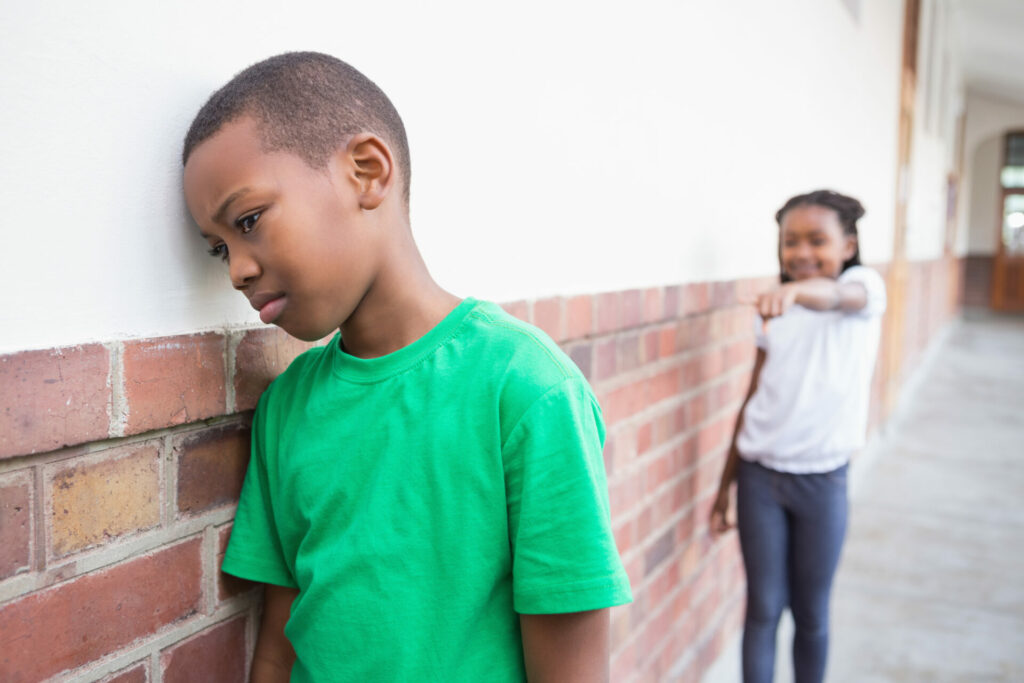
If you suffer from a fear of rejection, the following will sound all too familiar.
- You lack assertiveness in social situations.
- You consistently wear different masks to please people.
- You're afraid to say no and express your opinion.
- You're frustrated with your life, but instead of doing something about it, you internalize these feelings instead.
- You're afraid to speak up and share a different point of view
- You don't have a strong sense of self. You don't know who you are.
- You’re a chameleon, changing what you wear, what you say, and how you behave to fit in with the people around you.
- You feel like other people have superiority over you.
- You're extremely conscious of what others think of you.
- You shut down around loud, brash, or intimidating people.
- You don't share your gifts and talents with the world in the way you'd like to.
- You feel exposed whenever you reveal anything personal about yourself.
- You’re unable to feel relaxed or at ease in your body.
- You’d rather be hurt than hurt somebody else.
- You feel selfish asking someone to consider your needs.
- You don't share your dreams or goals for fear of being laughed at, ridiculed, or discouraged.
How many fear of rejection symptoms do you experience? The more symptoms you have, the more this fear runs your life. You might not want to admit that you have these symptoms, but acknowledging this fear is a vital step towards overcoming it.
If you can’t see how the symptoms of a fear of rejection manifest in your life, then you won’t be aware and awake enough to make a change. So be honest with yourself.
How Do I Stop Being Afraid of Rejection?

Start Making Your Own Decisions
Fear wants to keep you safe by keeping you stuck. DO NOT LISTEN.
To get over your fear of rejection, you must, must, MUST begin making your own decisions. You decide how you’re going to show up. This might be really difficult at first because maybe you don’t know who YOU are right at this moment. In this case, your first step is taking the time to look inward and figure that out.
Who are you? What are your values? What are your needs? What are your boundaries? What do you stand for?
Do you want connection or isolation? What do you value more? You have to make the choice to connect no matter what, even if it’s hard.
Do you want self-expression or agreement? There’s nothing wrong with agreeing with other people's opinions, but if you’re using that agreement as the basis of your connections, you’re very likely feeling stuck.
Do you want to have integrity, or will you settle for other people’s values?
Making your own decisions takes being internally focused. It takes self-acceptance. You have to focus on your own values instead of looking for validation and recognition from others. It’s normal to want these things, but when other people’s approval becomes more important than your own, such as when you’re externally focused, it’s very easy to get off track.
Take the Time to Prepare for Rejection
Right now, your fear of rejection is still strong, and it may even have a deep hold on you. So, in the beginning, I want you to do all that you can to prepare for rejection.
Fearbuster Exercise™:
Prepare your response before you go into a situation. Use role play methods, memorize, practice, and then practice some more. You’re preparing for the worst. You’re preparing for rejection. How will you feel, what will you say, and what will you do should the worst happen and you feel rejected in some way?
Now, you might be thinking, “Rhonda, I already do prepare for rejection. I’m constantly thinking about the worst that could happen. I always think I’m about to be rejected!”
This is not what I mean by prepare. That way of doing things has you stuck ruminating on and being addicted to the worst. Do you play out scenario after scenario of the worst things that could possibly happen? If you’re doing that, you’re indulging yourself in making up worst case scenarios and imagining them to be true.
You’re labeling everything as bad before it even happens. And if you’re anything like most people (and you are!), you can probably find something wrong with almost everything.
What I want you to do is prepare for both the worst and best case scenarios. You’re not attached to either, and neither is set in stone, but you’re creating a game plan.
List your Fear Responses.
List all of the ways you could respond to a situation and brainstorm alternative choices—choices that empower you before you enter a situation.
What if X happens? Will I survive that? Will my life go on? Will I be harmed? Play out the full scenario like it’s a game. Fear of rejection is tied to taking things too seriously. Any little comment or action can be seen as rejection, even if it’s not at all intended that way.
Creating a plan of action bolsters your confidence and gives you something to run towards instead of from.
Shift Your Negative Self-Talk
Do you speak negatively about yourself? Either out loud or inside your head? This behavior feeds into your fear of rejection. You are projecting negative thoughts about yourself before they come from anyone else, negatively affecting your mental health and encouraging poor self-esteem.
Begin to notice when this happens. You might make a joke about yourself in front of others, or maybe you’re putting yourself down in your head, saying things like, “That person doesn’t like me.” “I’m not going to get this job.” “I’ll never succeed at my dreams.” “My partner’s going to break up with me.”
Ask yourself: Am I making it up, or is it a fact?
Is what you're thinking about yourself or about other people based in fact? Do you know it to be true? Or are you making it up?
I had a client, Katie, who always came to me saying, “My boss hates me.” She was convinced it was true. But when we dug further, and when I asked Katie how she KNEW that to be true, the facts weren’t there. How do you know your boss hates you? Did your boss tell you she hates you? Did your boss tell someone else they hate you? Did your boss do something specific that implies they hate you?
It wasn’t true, but Katie believed it was true. She was fueling her fear of rejection, her fear of not being good enough, and her fear of being judged all without having the facts to back anything up.
Fear of rejection needs fuel, and that’s what you’re doing when you engage in negative self-talk and self-criticism.
You allow your brain to fill in the blanks without having the facts. You might walk by a mirror and think, “Oh, I’m so fat.” You go on a date, and afterward, you think, “I said too much.”
Notice when this happens and interrupt these thoughts. Ask yourself if it’s true or not, and then pivot. To pivot, tell yourself a different story.
If you act from a place of fear, you will never have a give and take relationship because the entire relationship is taking place in your head. “They think this about me.” “I said too little.” “I said too much.” “I’m not good enough at my job.” “I’m not good enough for the relationship I’m in.”
You are playing both parts. You’re overthinking every situation and allowing it all to play out internally.
I’ll say again: PIVOT, PIVOT, PIVOT.
Reframe those thoughts. Take your power back.
Thank you for sticking with me so far, but don’t stop your fear journey here. In my full How to Overcome Fear of Rejection course, available with Fearless You, I share additional insights, strategies, and Fearbuster exercises that will help you wherever you are on your current fear journey.
Save this article to look back on whenever you feel stuck, and don’t forget about the supportive community we have at Fearless Living. We’ve all been where you are now, and we all want you to get out of that fear rut and stop feeling stuck. There’s a whole world of possibilities out there waiting for you once you free yourself from fear.
Cracking Your Fear of Rejection With Fearless Living
Unraveling the riddle of your fear of rejection is only a small piece of the Fearless Living community. A Fearless You membership grants you access to the entire How to Overcome Fear Series, which includes the 10 most common fears, like Fear of the Unknown, Fear of Not Being Good Enough, Fear of Loneliness, and more.
As long as you have a Fearless You membership, my How to Overcome Fear Series will be available to you. And not only that, but you’ll also have access to dozens of other lessons, courses, and live sessions. The complete Fearless You library will only be a few clicks away, ready and waiting to help you live the life your soul intended.™
Learn more about Fearless You and continue following the Fearless Living blog for free weekly content on everything from how to say no to the people you love to identifying fundamental components of fear to finding and following your soul purpose.
Fear of rejection is one the top ten most common fears. Every human being on this planet has a fear of rejection. Sure, it’s more severe for some than others, but every single human has faced a fear of rejection at some point in their lives.
Today, if you keep reading, you’ll learn that fear of rejection isn’t personal—it’s actually handed down through our DNA. That’s right: Fear of rejection has been passed down from your ancestors to you through your DNA.
It’s completely natural to fear rejection and do all you can to avoid rejection. It’s not a fun feeling! But that natural, biological response shouldn’t rule your life, and it shouldn’t keep you from living the life your soul intended.™
I want you to be able to face rejection in stride, to not fall apart, to not shut down, to not walk away, to not beat yourself up, to not be humiliated, and on and on and on.

I want you to be the resilient, confident, happy person you are underneath that cloak of fear that’s kept you down for far too long.
I’m so glad you’re here with me today because I’ll show you how to move beyond your fear of rejection.
You may not realize it, but that fear is stopping you from living your life to its fullest. It’s paralyzing you. It’s keeping you from connecting with people and having deeper relationships.
It’s blocking you from sharing your true gifts and talents. It’s pushing you away from your DESTINY!
Let's stop and think about that. Is fearing rejection keeping you from living the life you want to live?
I want you to be honest with yourself today. The more honest you are, and the more you take personal responsibility for making changes, the more results you will receive in return.
First, I’ll share a little more about the Fearless Living way for anyone who is joining us for the first time. Next, I’ll break down the symptoms of a fear of rejection, the science behind why we fear rejection, and the actionable strategies you can begin using today to move beyond your fear of rejection.
A Fearless Living Introduction: Overcoming Fear
What comes to mind when you think about fear? For many of us, we automatically jump to common phobias, like a fear of heights, public speaking, or clowns. 🤡 While these are definitely legitimate fears many of us face, they’re not the kind of fears we speak about at Fearless Living.
Our focus at Fearless Living is on emotional fears—the fears that penetrate deep into the heart of our self-confidence, self-esteem, and self-love. Our emotional fears, consciously or unconsciously, lead us down the wrong paths. Paths that push us ever further away from realizing our deepest dreams, goals, desires, and living the life our soul intended.™
The 10 most common emotional fears are:
- Fear of Failure
- Fear of Success
- Fear of Intimacy
- Fear of the Unknown
- Fear of Loneliness
- Fear of Not Being Good Enough
- Fear of Loss
- Fear of Change
- Fear of Being Judged
- Fear of Rejection
Right here on my blog, I am sharing insights into the fundamental fears we discuss at Fearless Living. For an overview of each type of fear, as well as the difference between emotional fears and common phobias, read my article: 10 Common Types of Fear and How to Overcome Them.
What Causes a Fear of Rejection?
What is the fear of rejection called? Yes, it actually has a real name! In scientific terms, fear of rejection is called anthropophobia. It’s the term used to describe a fear of rejection that has turned into a phobia.
Phobias are serious health concerns that can cause anxiety, depression, and even physical pain. IMPORTANT NOTE: Anxiety disorders can be very serious and should never be ignored. If you continue to experience extreme emotional or physical symptoms, you should speak to your doctor.
Now, you may not be at that stage, but it’s likely you still struggle with a fear of rejection.
When you experience rejection, it feels like exclusion.
It FEELS personal.
Your brain interprets that you don’t belong. You don’t fit in. “Go away, you’re not one of us, you never will be, and you never were.”
Fear of rejection has a lot in common with the fear of being judged. As humans, we all want to belong so desperately. This desire is deeply ingrained in our human nature. It stems from our biological instincts, which developed a long, long, LONG time ago.
Belonging to a tribe meant safety. Numbers and family units meant protection, shelter, and survival support. And even though most of us don’t need this kind of protection today, those biological instincts are still there. We don’t want to feel excluded because rejection means we could be pushed outside the safety of our “tribe.”
We could die if we’re left to fend for ourselves! And even though that’s not the case in your daily life, the fear it triggers is the same.
Research shows human beings need emotional connections and a sense of belonging in order to survive, just like we need food and water. Additionally, research tells us the reactions produced by the brain as a result of rejection are not that far off from those produced by physical pain.
Let’s say that again because I want this to sink in for you. Neuroscience says the reactions in your brain to experiencing the emotional pain of rejection are not that different from experiencing physical pain.
Rejection is PAINFUL! It HURTS!
So no, you aren’t at all crazy for reacting so strongly to rejection. However, reacting strongly shows you’ve allowed your fear of rejection to make decisions for you. It has taken control. It’s influencing the decisions your wisdom, intuition, and experience should be guiding instead.
Being rejected or feeling rejected, especially by those we love, is a horrible feeling. It feels so bad that many people build walls and do everything they can to protect themselves from the possibility of being rejected.
And what does this mean? Those walls, put up by fear, can keep you from finding love, building fulfilling relationships, finding a career you enjoy, and pursuing your dreams.
Fear convinces you it’s better not to try at all than it is to risk rejection. But this way of thinking and making decisions can have a profoundly negative impact on your life.
Fear of Rejection Examples
You might not try for a promotion because what if you don’t get it? Fear interprets this as a rejection, telling you it’s not even worth trying for the promotion (even if you’re qualified) because you might not get it. You reject the possibility of rejection to not feel rejected.
In reality, the only way to guarantee you don’t get that promotion is not to apply for it.
If you make the effort, you might actually get it. If you don’t, it’s not a failure; putting yourself out there is an achievement in and of itself. You showed your company you are interested in achieving more. Plus, you learned a lot along the way, which is information you can apply the next time an opportunity presents itself. That’s a win in my book!
Let’s look at another example. You choose not to go on a date because what if that person doesn’t like you? What if they judge you for how you look? What if they don’t want a second date? Of course, there’s always the possibility that the people you date, love, or even marry won’t reciprocate how you feel about them. But keep in mind they are also taking the same risk as you; what if you reject them?
But that chance of rejection doesn’t mean all attempts at a relationship are pointless. Humans thrive on the love, caring, and companionship a relationship can provide. So just like with that promotion, the only way to guarantee you never find a loving relationship is to never put yourself out there. By rejecting the possibility of rejection, you create a self-fulfilling prophecy.
Risk is so, so, SO intertwined with our fear of rejection.
When fear is strong within us, we view every risk, every chance, anything that’s not a 100% guarantee as a chance we might be rejected. And so we avoid risk at all costs.
But without a little risk, there is no reward.
I have so much to say about risks. To learn more, read my full article on How Taking Risks Can Lead You to a Better Life.
Without taking risks, I never would have won an Emmy. I wouldn’t have published a book. I wouldn’t have started my own business. I wouldn't have pursued romantic relationships. I wouldn't have even traveled outside of my hometown.
I’d be nowhere without those risks, and the same is true for you. You can’t reach your true potential, and you can’t build your dream life, with a fear of rejection holding you back.
How do you know if that’s what is holding you back? Next, I’ll list some common symptoms of a fear of rejection that I bet will sound pretty darn familiar to you.
Fear of Rejection Symptoms

If you suffer from a fear of rejection, the following will sound all too familiar.
- You lack assertiveness in social situations.
- You consistently wear different masks to please people.
- You're afraid to say no and express your opinion.
- You're frustrated with your life, but instead of doing something about it, you internalize these feelings instead.
- You're afraid to speak up and share a different point of view
- You don't have a strong sense of self. You don't know who you are.
- You’re a chameleon, changing what you wear, what you say, and how you behave to fit in with the people around you.
- You feel like other people have superiority over you.
- You're extremely conscious of what others think of you.
- You shut down around loud, brash, or intimidating people.
- You don't share your gifts and talents with the world in the way you'd like to.
- You feel exposed whenever you reveal anything personal about yourself.
- You’re unable to feel relaxed or at ease in your body.
- You’d rather be hurt than hurt somebody else.
- You feel selfish asking someone to consider your needs.
- You don't share your dreams or goals for fear of being laughed at, ridiculed, or discouraged.
How many fear of rejection symptoms do you experience? The more symptoms you have, the more this fear runs your life. You might not want to admit that you have these symptoms, but acknowledging this fear is a vital step towards overcoming it.
If you can’t see how the symptoms of a fear of rejection manifest in your life, then you won’t be aware and awake enough to make a change. So be honest with yourself.
How Do I Stop Being Afraid of Rejection?

Start Making Your Own Decisions
Fear wants to keep you safe by keeping you stuck. DO NOT LISTEN.
To get over your fear of rejection, you must, must, MUST begin making your own decisions. You decide how you’re going to show up. This might be really difficult at first because maybe you don’t know who YOU are right at this moment. In this case, your first step is taking the time to look inward and figure that out.
Who are you? What are your values? What are your needs? What are your boundaries? What do you stand for?
Do you want connection or isolation? What do you value more? You have to make the choice to connect no matter what, even if it’s hard.
Do you want self-expression or agreement? There’s nothing wrong with agreeing with other people's opinions, but if you’re using that agreement as the basis of your connections, you’re very likely feeling stuck.
Do you want to have integrity, or will you settle for other people’s values?
Making your own decisions takes being internally focused. It takes self-acceptance. You have to focus on your own values instead of looking for validation and recognition from others. It’s normal to want these things, but when other people’s approval becomes more important than your own, such as when you’re externally focused, it’s very easy to get off track.
Take the Time to Prepare for Rejection
Right now, your fear of rejection is still strong, and it may even have a deep hold on you. So, in the beginning, I want you to do all that you can to prepare for rejection.
Fearbuster Exercise™:
Prepare your response before you go into a situation. Use role play methods, memorize, practice, and then practice some more. You’re preparing for the worst. You’re preparing for rejection. How will you feel, what will you say, and what will you do should the worst happen and you feel rejected in some way?
Now, you might be thinking, “Rhonda, I already do prepare for rejection. I’m constantly thinking about the worst that could happen. I always think I’m about to be rejected!”
This is not what I mean by prepare. That way of doing things has you stuck ruminating on and being addicted to the worst. Do you play out scenario after scenario of the worst things that could possibly happen? If you’re doing that, you’re indulging yourself in making up worst case scenarios and imagining them to be true.
You’re labeling everything as bad before it even happens. And if you’re anything like most people (and you are!), you can probably find something wrong with almost everything.
What I want you to do is prepare for both the worst and best case scenarios. You’re not attached to either, and neither is set in stone, but you’re creating a game plan.
List your Fear Responses.
List all of the ways you could respond to a situation and brainstorm alternative choices—choices that empower you before you enter a situation.
What if X happens? Will I survive that? Will my life go on? Will I be harmed? Play out the full scenario like it’s a game. Fear of rejection is tied to taking things too seriously. Any little comment or action can be seen as rejection, even if it’s not at all intended that way.
Creating a plan of action bolsters your confidence and gives you something to run towards instead of from.
Shift Your Negative Self-Talk
Do you speak negatively about yourself? Either out loud or inside your head? This behavior feeds into your fear of rejection. You are projecting negative thoughts about yourself before they come from anyone else, negatively affecting your mental health and encouraging poor self-esteem.
Begin to notice when this happens. You might make a joke about yourself in front of others, or maybe you’re putting yourself down in your head, saying things like, “That person doesn’t like me.” “I’m not going to get this job.” “I’ll never succeed at my dreams.” “My partner’s going to break up with me.”
Ask yourself: Am I making it up, or is it a fact?
Is what you're thinking about yourself or about other people based in fact? Do you know it to be true? Or are you making it up?
I had a client, Katie, who always came to me saying, “My boss hates me.” She was convinced it was true. But when we dug further, and when I asked Katie how she KNEW that to be true, the facts weren’t there. How do you know your boss hates you? Did your boss tell you she hates you? Did your boss tell someone else they hate you? Did your boss do something specific that implies they hate you?
It wasn’t true, but Katie believed it was true. She was fueling her fear of rejection, her fear of not being good enough, and her fear of being judged all without having the facts to back anything up.
Fear of rejection needs fuel, and that’s what you’re doing when you engage in negative self-talk and self-criticism.
You allow your brain to fill in the blanks without having the facts. You might walk by a mirror and think, “Oh, I’m so fat.” You go on a date, and afterward, you think, “I said too much.”
Notice when this happens and interrupt these thoughts. Ask yourself if it’s true or not, and then pivot. To pivot, tell yourself a different story.
If you act from a place of fear, you will never have a give and take relationship because the entire relationship is taking place in your head. “They think this about me.” “I said too little.” “I said too much.” “I’m not good enough at my job.” “I’m not good enough for the relationship I’m in.”
You are playing both parts. You’re overthinking every situation and allowing it all to play out internally.
I’ll say again: PIVOT, PIVOT, PIVOT.
Reframe those thoughts. Take your power back.
Thank you for sticking with me so far, but don’t stop your fear journey here. In my full How to Overcome Fear of Rejection course, available with Fearless You, I share additional insights, strategies, and Fearbuster exercises that will help you wherever you are on your current fear journey.
Save this article to look back on whenever you feel stuck, and don’t forget about the supportive community we have at Fearless Living. We’ve all been where you are now, and we all want you to get out of that fear rut and stop feeling stuck. There’s a whole world of possibilities out there waiting for you once you free yourself from fear.
Cracking Your Fear of Rejection With Fearless Living
Unraveling the riddle of your fear of rejection is only a small piece of the Fearless Living community. A Fearless You membership grants you access to the entire How to Overcome Fear Series, which includes the 10 most common fears, like Fear of the Unknown, Fear of Not Being Good Enough, Fear of Loneliness, and more.
As long as you have a Fearless You membership, my How to Overcome Fear Series will be available to you. And not only that, but you’ll also have access to dozens of other lessons, courses, and live sessions. The complete Fearless You library will only be a few clicks away, ready and waiting to help you live the life your soul intended.™
Learn more about Fearless You and continue following the Fearless Living blog for free weekly content on everything from how to say no to the people you love to identifying fundamental components of fear to finding and following your soul purpose.


